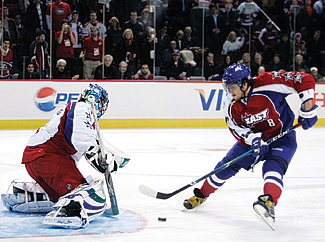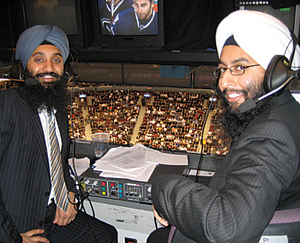Hockey All-Stars' Breakaway

East Conference all-star Alex Ovechkin of the Washington Capitals scores a goal in the overtime shooot-out against West Conference all-star goalie Roberto Luongo of the Vancouver Canucks during the NHL All-Star hockey game in Montreal, Jan. 25. Photo: Reuters/Christinne Muschi/LandovMONTREAL
The National Hockey League and its new Russian rival, the Kontinental Hockey League, are intent on reaching a larger fan-base through outdoor matches in cachet venues, new broadcast ventures, and multilingual channels.
For the first time, the NHL's All-Star Game last month featured a Punjabi language broadcast in Canada. And matching the NHL's New Year's Day game in Wrigley Field, the KHL hosted its first All-Star Game in Red Square, boasting temperatures near zero degrees and stars poached from the NHL's New York Rangers, Islanders and Ottawa Senators teams; the event was picked up way beyond Russia's borders.
MOSCOW ON THE HUDSON
Universal Sports provided a live TV broadcast to its subscribers in New York, New Jersey, Connecticut, Los Angeles and other U.S. markets. Formerly World Championship Sports Network (see "A Day at the Races," May 1, 2008), the broadcaster, which specializes in Olympic and lifestyle sports programming, teamed up with NBC Sports last year to create the Universal Sports partnership.
Universal Sports' announcers called the game in English from the company's Los Angeles studio. The network ran its own ads, and produced its own content during intermissions, including a preview of 2009 Ice Hockey World Championships, which will air on Universal Sports, as well as a piece on the growing US-Finland rivalry, according to T.K. Gore, director of marketing & communications.
Universal Sports also hosted live and on-demand Webcasts that drew a "strong international Web audience" from Russia, Sweden, Germany, Latvia, Czech Republic and Canada. Gore also noted that the coverage created a buzz among U.S. mainstream and sports media, as well as "over 30 hockey blogs." No formal ratings were available (Nielsen does not monitor Universal Sports broadcasts).
O CANADA
Prompted by a growing multi-lingual Canadian population, the Canadian Broadcasting Corp. decided to telecast the 55 game-schedule of its popular "Hockey Night in Canada" program as well as the 57th NHL All-Star Game, in Punjabi, the native language of millions of inhabitants of India, Pakistan and expatriates resettled elsewhere. The Punjabi broadcasts are available on www.CBCSports.ca, thanks to sponsor Scotiabank, one of Canada's largest financial institutions. In addition to over-the-air, the games are also available on Rogers, Bell TV and Shaw Digital Cable.
CBC owns the English broadcast rights to televise NHL games in Canada (Montreal-based RDS owns Canada's French broadcast rights). Although CBC produced Spanish and Italian broadcasts earlier, the big multilingual push began at the 2008 "Hockey Day in Canada," an annual event showcasing the country's six NHL teams: the Calgary Flames, Edmonton Oilers, Montreal Canadiens, Ottawa Senators, Toronto Maple Leafs and Vancouver Canucks. CBC streamed last year's event in Cantonese, Hindi and Mandarin as well as English. CBC streamed Mandarin and Punjabi language Webcasts live and on-demand throughout the 2008 Stanley Cup Final.
CBC's multilingual experiment was sparked by a Statistics Canada report on the 2006 census, which noted that almost one fifth of the country's total population spoke "non-official languages" (something other than English or French). More than a million Canadian residents speak a Chinese dialect and almost 400,000 speak Punjabi. Statistics Canada also projected that the country's "visible minority population" would grow considerably faster than the rest of the populace. Other consultants agreed.
But the deciding factor came from the results of a two-year survey by the Toronto-based Print Measurement Bureau that noted a large hockey fan base among South Asians and Chinese.

Parminder Singh, host of Omni Television's Punjabi-language program Chardi Kalaa, handles play-by-play for the Punjabi language broadcasts, working alongside analyst Harnarayan Singh, a freelance reporter with CBC Radio in Calgary. "Field hockey is huge in India," said play-by-play announcer Parminder Singh in an interview with CBC talk show host George Stroumboulopoulos. As for the expatriates, Singh said that Punjabi-speaking Sikhs "have been in this country for over a hundred years—so hockey's in our blood."
By late January, Facebook's NHL Hockey in Punjabi Group had already attracted 2,702 accounts.
"For the first time the older generation and the younger generation are sitting down on a Saturday night watching a Canadian institution—hockey—in their own language," said Joel Darling, production executive for CBC Sports.
TECH MOVES
Meanwhile, the broadcast crew was determined to treat the entire audience—regardless of where they were from—to hockey, Canadian-style. "We show the anthem before the games, the players walking out, special ceremonies; that's why the All-Star Game fit in well with us," said Sherali Najak, executive producer of the CBC's signature "Hockey Night in Canada," that country's equivalent of "Monday Night Football."
The emphasis was, as always, up close and personal.
"Our goal is to make sure that any penalty, any play, is shown by an isolation camera, as opposed to a wider camera," said Najik. "It's just more potent, it's more immediate. You get a closer angle of what exactly happened. "We have an isolation system that we invoke to make sure we have the right guys covered on the ice at all times."
Najak noted that his crew is also experimenting with new technologies including 30-minute podcasts. Current initiatives include 360-degree camera rigging, an updated stealth camera and a Web feature that can track players selected by an audience vote, he said.
"We're putting some time and effort into some research on how we can help the game," said Najak.
Get the TV Tech Newsletter
The professional video industry's #1 source for news, trends and product and tech information. Sign up below.
